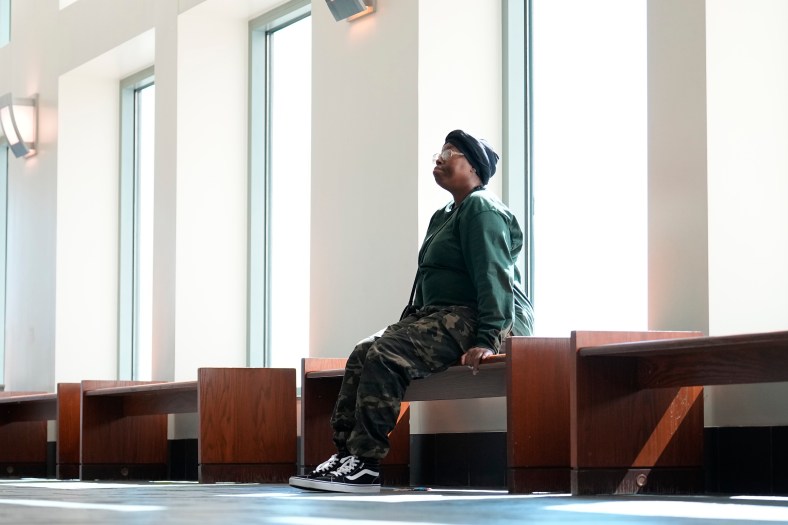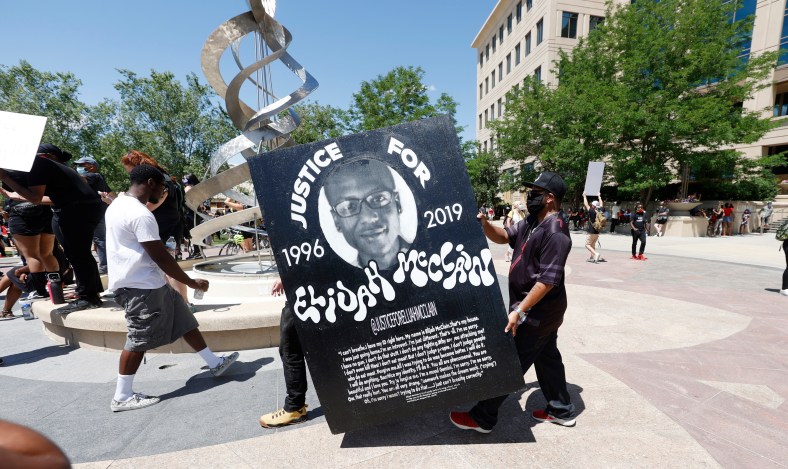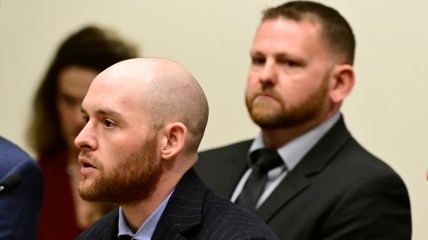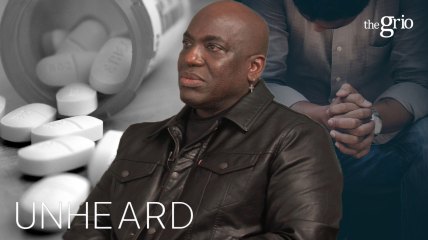Prosecutors say officers who put Elijah McClain in neck hold ignored pleas of ‘I can’t breathe’
Officials have determined the sedative ketamine played a key role in McClain’s death, which fueled renewed scrutiny about when emergency workers can administer it.
BRIGHTON, Colo. (AP) — Two Denver-area police officers who put Elijah McClain in a neck hold ignored his pleas of “I can’t breathe” before the Black man was injected by paramedics with a powerful sedative and died, prosecutors said Wednesday, as a trial began over the 2019 confrontation that became a rallying cry for protests and spurred police reform.
In opening arguments for the first of several trials stemming from McClain’s death, lawyers for the two sides painted contrasting pictures of the fatal struggle after he was stopped by police in Aurora.

Officers Randy Roedema and Jason Rosenblatt approached McClain, a 23-year-old massage therapist, as he walked home from a convenience store carrying only a plastic bag with three cans of iced tea and his phone. A 911 caller had reported him as “sketchy.”
If prosecutors can convince jurors the Aug. 24, 2019 stop was unjustified, that would undermine any argument that McClain’s injuries were a result of the officers just doing their jobs.
Roedema and Rosenblatt are both charged with criminally negligent homicide, manslaughter and assault. They have pleaded not guilty but have never spoken publicly about the allegations against them. The trial is expected to last about a month.
A third officer and two paramedics are also charged in McClain’s death and are scheduled for trial later this year.
Officials have determined the sedative ketamine played a key role in McClain’s death, which fueled renewed scrutiny about the use of the drug for people considered to be acting erratically and led Colorado’s health department to limit when emergency workers can administer it. In 2020, neck holds by police were banned by the state’s Democratic-led Legislature.
Prosecutor Jonathan Bunge said the officers violated department policies by using excessive force against McClain, who was unarmed, and failing to deescalate the situation.
“Listen to Elijah’s words,” Bunge said as he replayed police body camera video of the episode. “When Elijah is on the ground handcuffed, he’s saying over and over and over again, ‘I can’t breathe. Please help me.’”
McClain threw up repeatedly after the neck hold and was drowning in his own vomit, according to Bunge. “He is drifting further and further toward death. The sedative is the last thing he needs,” the prosecutor said.
But Roedema’s attorney, Reid Elkus, said the officers’ actions were in line with department policies and their own training. McClain was stopped in a “high-crime area,” and officers repeatedly told him to halt before he complied, Elkus said, adding that they didn’t want to hurt him.
“Just because a tragedy occurred doesn’t mean criminality occurred,” Elkus said. He blamed McClain’s death on paramedics who later arrived on the scene and took control over his care.

“After being injected with ketamine, that’s when Mr. McClain’s pulse stopped,” Elkus said. “Mr. McClain died because paramedic (Jeremy) Cooper injected him with 1.7, 1.8 times the ketamine for someone his weight and size.”
Rosenblatt’s attorney, Harvey Steinberg, argued that the officers had no choice but to stop McClain after the 911 call. He added that McClain showed “continued resistance” after he was stopped and the officers were forced to respond accordingly.
“Please be fair and don’t allow emotion or sympathy come into it,” Steinberg told jurors. “And don’t let politics enter into this at all.”
McClain’s mother sat in the front of the courtroom for the opening statements. Sheneen McClain dabbed tears from her eyes when Bunge described how her son, who was often cold, was wearing a runner’s mask when he went to a convenience store near his house before police stopped him.
Family members of the two officers also were present, as were other Aurora police.
Before jury selection could be finalized, Judge Mark Warner talked behind closed doors with attorneys for both sides as well as a man whom the defense struck from the jury pool after he said he’d been racially profiled about a half-dozen times by police, including in Aurora. The man remained off the jury, but what happened in the closed discussions was not revealed in open court.
The 12 jurors and 2 alternates appeared to be mostly white.
Other potential jurors who were removed included a woman who identified herself as Hispanic and said her husband was singled out for arrest in a conflict with white people. Removals by prosecutors included the daughter of a police officer who said officers weren’t being supported by society and a former EMT who witnessed people being given ketamine.
In response to a defense objection, the judge found that the prosecution did not remove potential white jurors because of their race.
Charges were not brought for two years after McClain died, by which time a national reckoning had begun over racial injustice in American policing following the murder of George Floyd by officers in Minneapolis.

In 2019, a local district attorney, Dave Young, called McClain’s death “tragic” but decided against prosecuting the officers largely because the coroner’s office could not determine exactly how McClain died.
A revised coroner’s report was issued in 2021, relying in part on information from a grand jury investigation. It found the cause of death was complications from ketamine after McClain, who weighed 140 pounds (64 kilograms), overdosed because he received a higher dose than recommended for someone of his size, pathologist Stephen Cina found.
“I believe that Mr. McClain would most likely be alive but for the administration of ketamine,” Cina said.
Cina said he couldn’t rule out whether the stress of being held down by the officers may have contributed to McClain’s death.
Officer Nathan Woodyard, who is set to go on trial later this year, was the first to approach McClain and was soon joined by Roedema and Rosenblatt.
McClain, using earbuds, initially kept walking. Within 10 seconds, Woodyard put his hands on McClain, turning him around. As McClain tried to escape his grip, Woodyard said, “Relax, or I’m going to have to change this situation.”
The encounter quickly escalated, with officers taking him to the ground and putting him in a neck hold.
McClain suffered cardiac arrest on the way to the hospital and was pronounced dead three days later.
Prosecutors played numerous body camera clips including one in which they said McClain spoke his last words as Roedema jerked up on one of his arms, popping a joint.
“Please help me,” McClain was heard saying. “Please help me.”
TheGrio is FREE on your TV via Apple TV, Amazon Fire, Roku, and Android TV. Please download theGrio mobile apps today!



